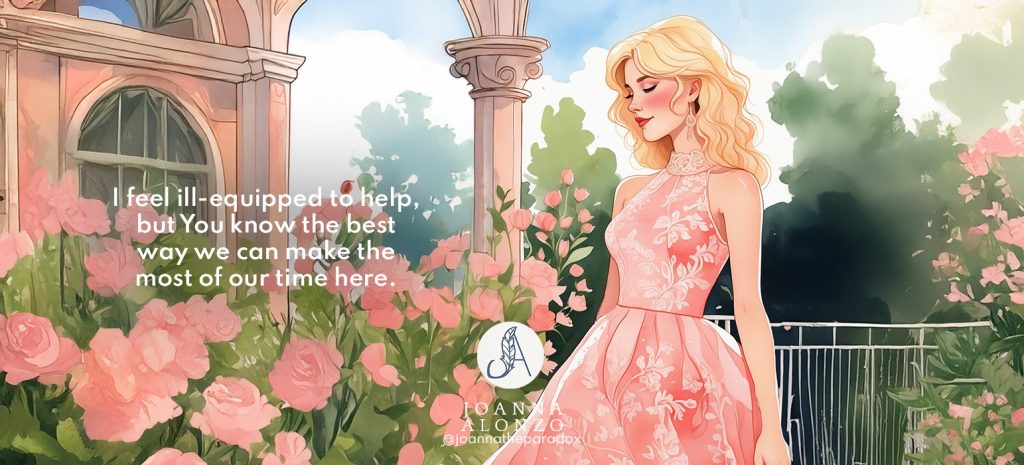A short ride on a passenger motor boat got them to the other side of a murky river intersecting the bustling city. The stench of the trash floating in the water and lining its banks assaulted Rachel’s nostrils as the boat’s motor roared to a halt beside a wooden ramp. One by one, their team filed out of the boat, careful to keep themselves balanced so as not to rock the wooden vessel. Rachel was the last to get out. At the pointy head of it, just as she was about to hop off the boat and onto the ramp, she wobbled enough to fear she might tip over and fall into the dirty water. Thankfully, Jeremy grabbed her wrist to hold her steady. She held on to his arm and hopped to the ramp that would lead her to solid ground.
“Thank you,” she said once her feet landed on the pavement. She breathed out a sigh of relief. The rest of the team was already way ahead of them as they made the short walk toward one of multiple towns — barangays — clustered close to each other.
“How are you holding up so far?” Jeremy asked. “Last night must have been intense for you. I was wondering if you would ever run out of tears.”
“It was intense, yes, but it was also necessary.” Rachel pulled out a white satin handkerchief from her back jean pocket and wiped sweat from her brow. The humidity had a way of making the blazing heat worse. “The tears needed to come out. I felt a lot lighter after.”
“Glad to hear that.”
“How about you?” Rachel had a skip in her step. “Excited about the day ahead?”
“I’m not sure ‘excited’ is the word,” Jeremy said. “Based on the last time we visited, it will be a lot to process.” This was a surprise coming from carefree Jeremy.
“Is it that heavy?”
A reserved smile appeared on his face. “You’ll see.”
They walked side-by-side toward the direction the rest of the team had gone off to. The homes surrounding them were made of wood, others of concrete blocks. Each home was painted in loud colors of blue, green, or yellow. Almost every home was covered by tin roofs. The homes were quaint and so close to the other homes, sometimes, the only way Rachel could tell the houses apart were the different paint jobs and window designs.
“Do you know where we’re going?” she asked.
Jeremy nodded. “Yeah. We’ll get there. Did the girls tell you anything about where we’re headed?”
“Malaya said something about spending some time with teenagers and children in a slum area in Manila. Is this it?”
“Not yet. This is the better part of the neighborhood, actually. The place we’re going to is not too far from here. Be forewarned, though. It can be more than a little overwhelming — it’s poverty unlike what we see back home.”
Rachel squared her shoulders as a way to physically brace herself for what was ahead. She kept in step with Jeremy, as they both turned a corner and started down a path, stony, muddy, and unpaved. She wrinkled her nose. Why had she worn her white Vans today? They would be impossible to clean later. She giggled at herself. She was surrounded by all this poverty, and all she could think about was how to clean her shoes?
The houses got smaller and smaller as they walked farther down the road. At some point, they couldn’t even be called houses anymore. Just boxes of wood, cardboard, and tin patched together to create some form of dwelling.
Jeremy nudged Rachel and pointed his thumb at a house with no door. Inside, a family of at least five were all huddled together on the wooden floor, watching a Filipino TV program on a large flat-screen TV on the wall. The juxtaposition of the expensive television set and the house of wood and tin threw Rachel’s head in for a loop.
“I don’t understand,” she said to Jeremy in a hushed voice. “Is it rude to ask about the TV? Am I wrong to think it looks completely out of place?”
“Strange, right? That’s a family with six children — the oldest is a fourteen-year-old, the youngest is at around two. The mother is jobless and is pregnant with a seventh child. The dad is a drunkard who does odd jobs here and there. I met the fourteen-year-old, Alex, last time we came here. We’ve kept in touch over the past year. He’ll be here to meet us later.”
“How are they surviving?” Rachel grimaced. “And what’s with the TV?”
“To help make ends meet, Alex dropped out of school and is helping his uncle with seasonal construction jobs. As for the flat-screen, the dad won it from a raffle draw. Alex said they plan to pawn it off once they’re desperate enough for money. For now, it’s a source of entertainment, and to some extent, prestige around the neighborhood.”
Rachel bit her lip as she tried to make sense of what Jeremy was saying. “They’re not desperate for money now? Shouldn’t they just sell the TV, so their kid could go to school?”
“The poverty spirit is a strange beast, Rachel. It’s a mix of keeping up with the Joneses and a complete disregard for the principle of delayed gratification. Strange as it may seem, a lot of the kids here aren’t dreaming of getting out of this community. They’re okay with life here. It’s their community. They belong. A lot of them drop out of school to take jobs that pay a pittance — just enough to get them through a month, a week, a day. They eventually get someone pregnant, get married, build up their own little shanty wherever, then the cycle continues for another generation.”
Jeremy might as well have been speaking in another language, because Rachel’s mind struggled to grasp what he was saying.

A little boy, who couldn’t be any older than three years old, ran up to them and smiled. Dirt smudged his face, and a soiled white shirt draped loosely from his shoulders down to his knees. He had one rubber flip-flop on his foot, while the other was on his hand, and he was waving it at them like some flag meant to welcome their arrival.
Rachel waved back at him. Where were his parents? He had such an innocent and childlike joy about him that was making her heart ache.
Jeremy extended his hand for the kid to high-five. The boy leapt to his feet — one slippered, and one barefoot — to high-five him, before taking his hand and pulling him toward a wooden stall selling food. Rachel remained where she stood, in the middle of a muddy clearing, surrounded by dozens upon dozens of square wood, tin, and cardboard shanties. Everything she laid her eyes on shocked her — visual overload of something so foreign to her, she never could have imagined it. The imagery consumed her for a few minutes, but what surprised Rachel the most were the smiles on people’s faces when they noticed the foreigners visiting their town.
“Barbie doll!” A little girl yelled at Rachel like she was accusing Rachel of being a toy. She then giggled, looked at the woman she was with, pointed at Rachel, and yelled, “Mama! Amerikana o!”
“There you are.”
Rachel flinched when someone touched her arm. She turned to her side to find Malaya casting a concerned look at her.
“Are you okay?” Malaya asked.
“A little shocked, to be honest.”
“Ah yeah. I get that. It’s a lot to take in.” Malaya nodded. “I was the same when I first joined the team last year. We’re meeting with our contacts for orientation. Where’s Jeremy?”
Rachel pointed at him. He was carrying the boy in his arms and was chatting with the store owner like they were long-lost friends. It struck her then how much he looked so out-of-place yet so in his element all at the same time.
This is an excerpt from the Christian love story, The One Who Shot Away.

